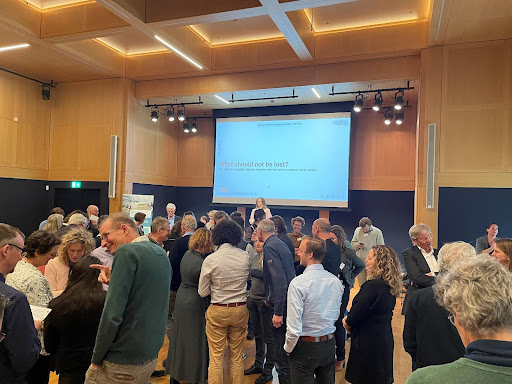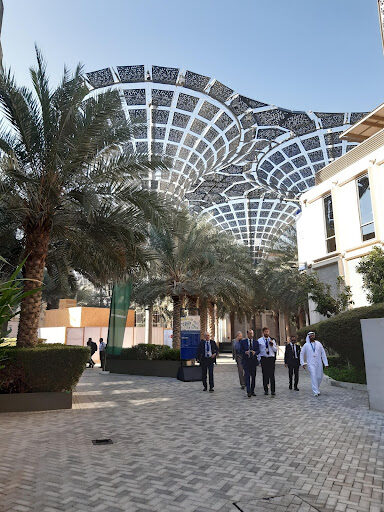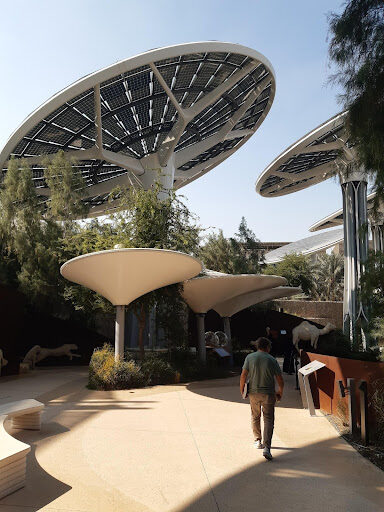
KIN Consultation meeting in Amsterdam; Photo credit: Diana Reckien
LOCALISED team members from the University of Twente took part in the consultation meeting KIN and will be joining the UCCRN webinar and the IPCC pre-scoping webinar in the next few days.
From 16-19 April in Riga, Latvia, the IPCC Working Group II on Impact, Adaptation and Vulnerability will hold its scoping meeting for the Special Report on Climate Change and Cities. During this scoping meeting, the broad contours of the report will be decided. In the run-up to this event, various institutions organize so-called pre-scoping meetings to gather a wide array of voices, experiences, and perceptions on problems, knowledge gaps, and potential solutions with regard to climate change in cities.
One such consultation meeting was organized by the Dutch KIN – Klimaatonderzoek Initiatief Nederland – Climate Research Initiative Netherlands, on 6th March 2024 in Amsterdam/ Netherlands. Other such meetings will follow, e.g., organized by Scientific Steering Committee for the Scoping of the IPCC Special Report on Climate Change and Cities itself (three webinars from 18th – 19th March) as well as by urban research networks, such as the Urban Climate Change Research Network (UCCRN) on 27th March in Rio de Janeiro, Brazil.

KIN Consultation meeting in Amsterdam; Photo credit: Cheryl de Boer.
Goals
The consultation sessions are planned to make the development of the Special Reports and related products of the IPCC more inclusive. In particular, the SR Cities, as it is called in short, invites broad stakeholder and practitioner involvement, as cities are much closer to the implementation realities on the ground.
Hence, it is hoped that the consultation meetings will pave the way for a breakthrough Report, innovative thinking, on-the-ground collaboration, and subsequent actionable strategies that can be implemented in cities around the world.
Key insights from urban researchers from the University of Twente, Faculty ITC, Department of Urban and regional Planning and Geo-Information Management
Colleagues from the University of Twente took part in the KIN consultation and will also be joining the UCCRN webinar and the IPCC pre-scoping webinar. In order to prepare for these events, Diana Reckien, University of Twente sent around a short inquiry to some faculty members working on climate and urban issues.
The topics below are a summarized collection of responses of urban experts (eight responses in total) from our UT-ITC colleagues for preparing the KIN Scoping Meeting, plus some discussion aspects with participants at the KIN Scoping in Amsterdam itself:
- How could the IPCC SR help you in your work/ position?
New forms of products of the IPCC Report would help communicate targeted information to students, the Youth, Children, and also particular sector policymakers. This could help in our teaching, but also in our applied research programs.
- What research and knowledge do you seek to realize effective climate policy and action? How could these be addressed by the IPCC report?
A transition-focus is key and even more a solution-focus. In order to be relevant, let cities do a reality check: i.e., let them read the interim IPCC drafts and decide whether the gathered information is useful to their transition processes. Also, a strong focus on synergies and trade-offs would be useful in order to allow policy responses to counterbalance negative side-effects and mange trade-offs.
- What form/shape of scientific reporting would you find helpful for your own work, please think about examples of literature that was useful for you.
Communication/ outreach of reports may concentrate on infographics, media, partnership networks, global data platforms, etc.. These maybe speaking/ organised in a way that they can speak to different audiences, such as youth, teachers, sector policymakers, etc.
To do so, a narrative that centers on different development needs, actors, decision spaces, scenarios and solutions/ effectiveness might be most helpful: E.g., Start with urban development needs; Map actors and their influence space(s); Develop many positive scenarios for each actor’s decision space and their effectiveness, so that policy makers and other urban decision-makers can choose between a number of positive and effective solution pathways.
Besides such a structural organisation of the report, it was recommended to use social media big times and very effectively to connect to parts of society that build an opinion through social media.
- What is particularly / urgently needed knowledge for urban policymakers?
UT-ITC colleagues particularly stressed the needed support to respond to climate impacts in cities of the Global South, as it is these cities that are most effected by climate change globally and have the least capacity to adapt. For example, could there be a free database developed with detailed climate change impacts on many African cities? Likewise for cities in low-income countries, not only the current state of development and climatic changes is already challenging, but also the population influx from surrounding rural areas. How can such growth and be accommodated? .
In other countries, nature-based solutions are currently a big topic. But not all nature-based solutions are equally suitable and effective in all regions. As they are applied so widely but are not suitable everywhere, which form of nature-based solution works well/ is effective?
Another topic regards finance: how can scare financial resources be spent most wisely? Can there be a priority list of climate responses for cities, e.g., how the L&D fund could be most effectively used in cities of the South?
Finally, a pressing issues was also voiced with regard to the management of land: a lot of our conflicts are conflicts over land. We need start discussing multi-functional land uses, best on multiple levels, e.g., below ground, on the ground, 2-30m above ground, 30+m above ground. What are suitable management and administration processes for multi-functional land use?
With that, the University of Twente has already gathered a number of challenging problems that cities around the world currently face. If solutions could be developed collaboratively with cities to assess feasibility, progress could be made in formulating and testing solutions. However, it is anticipated that many more issues and aspects will arise during the next consultation meetings, including insights from experts attending the Scoping meeting in Riga and input from national governments, who ultimately determine the content and format of the Special Report on Climate Change and Cities. The collective effort should persist in working towards resilient and equitable solutions for both present and future urban landscapes.
Author: Dr. Diana Reckien.

Solar energy solutions in Expo City Dubai’s. Photo credit: Diana Reckien

Solar energy solutions in Expo City Dubai’s. Photo credit: Diana Reckien
Special thanks to: Lorraine Trento Olivera; Javier Martinez, Anton Vrieling, Han Yu, Cheryl de Boer, Karin Pfeffer, Jaap Zevenbergen.

Recent Comments